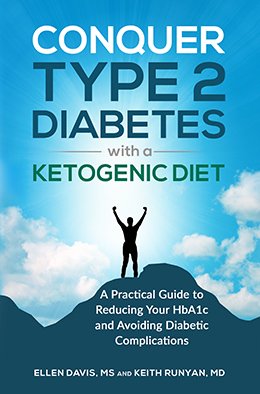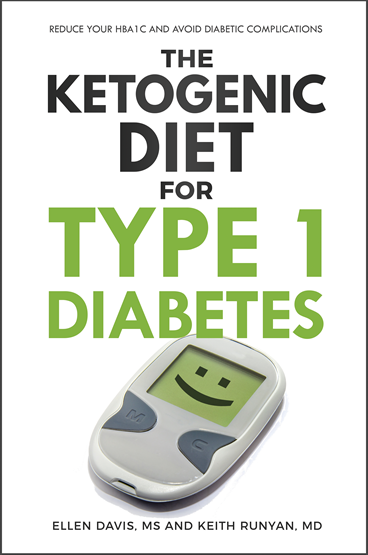Restore Your Health with a Ketogenic Diet
Updated May 9, 2022. Medical review by Curtis Lee Songster, MD
The ketogenic diet is a very-low carbohydrate diet, and quite different from the standard American diet, which is high in carbohydrates (starches and sugars). Humans didn't evolve eating a high carbohydrate diet, and as seen from the state of chronic disease rates in the US, a high carbohydrate intake can cause a wide range of metabolic issues for us humans.
In contrast, a "keto" diet restricts daily carbohydrate intake to a much smaller amount. This results in meals which are based on protein and fat instead, and a diet which supports good health.
Restricting carb intake helps your body switch from using sugar (carbs) as a main energy source to using fat and ketones as fuel. Using fat as a primary biological fuel can improve or even reverse many serious health conditions.
Plus, meals are very satisfying! In practice, the keto diet allows you to eat real foods in the form of natural
fats (butter, olive oil) and protein (meat, fish, poultry) while carbohydrates (pasta, bread, cake, candy etc..) are restricted. On this website, I’ll talk about how the diet works, how it can improve your health, and I'll share
details on the proper implementation of a keto diet.
How Do Ketogenic Diets Work?
When you eat carbohydrates, your digestive system breaks them down into simple sugars, and releases them into your bloodstream. As blood sugar rises, your pancreas releases insulin, a hormone that manages blood sugar. If every meal is high in carb, it results in chronically elevated blood sugar and insulin, and this can cause serious health problems such as type 2 diabetes, cancer and fatty liver.
If you instead eat mostly fat and protein and severely restrict carb intake, over time, your cells will switch metabolic pathways, and burn stored and dietary fat as a primary energy source. As blood sugar and insulin levels fall, more fat is released from storage and burned, and some of it will be converted into ketone bodies. Your muscles (skeletal and heart) will use the fat molecules to fuel themselves, while your brain utilizes the ketones.
The result is more energy, clearer thinking and better health. Ketones are beneficial to your body in many different ways and being in "nutritional ketosis" (where blood sugar is low and ketone levels are in the 0.5 - 3.0 mmol range) has some powerful effects on your metabolism and overall health. There are now many strong research papers on PubMed.gov which provide evidence that ketogenic diets can be used to treat the following medical conditions:
Cancer: Metabolic Therapy
The current body of research on metabolic cancer treatments using a keto diet continues to grow. Keto or metabolic cancer therapy is somewhat different than the treatment for other illnesses, and is discussed in detail in my book Fight Cancer with a Ketogenic Diet, which is based on the metabolic therapy research of Dr. Thomas Seyfried and Dr. Dominic D'Agostino. The book was written for the patient and has all the details and research in an easy-to-use workbook format.
I first released this book in 2012. Now in 2021, the research is confirming that being in nutritional ketosis affects cancer by starving individual cancer cells of the sugar and other fuels they need to survive. In addition, being in ketosis provides support and protection for normal energy processes in healthy cells. The advantage of this treatment protocol is that it is non-toxic to the body, and in "wait and see" cases, it can provide an major health support advantage to the patient.
This third edition of Fight Cancer with a Ketogenic Diet is also available in paperback form on Amazon and Barnes & Noble.
Diabetes in All Forms
Type 2 Diabetes: Although the current mainstream diabetes treatment advice to eat 45-65% of calories from carbohydrate is starting to change, many practitioners are still giving out the old advice. The simple fact is that eating carbs causes a rise in blood sugar. As blood sugar spikes, more medication and insulin is needed to bring it down. Chronic high blood sugar also results in tragic and in many cases, unnecessary health complications. In contrast, a ketogenic diet reduces and in many cases, eliminates the need for diabetic medications and lowers the number of insulin units needed to manage blood sugar. Learn more in our Conquer Type 2 Diabetes e-Book or click on the book cover.
Type 1 Diabetes: Lowering carb intake and increasing fat intake is also beneficial for people with Type 1, Type 1.5 diabetes and LADA. A low carb diet can help reduce the number and severity of hypoglycemic episodes, lower HbA1c test results and minimize future diabetic complications. Learn more in The Ketogenic Diet for Type 1 Diabetes e-Book or click on the book cover. These benefits are also possible for children with Type 1 and their parents should know that they have options.
Both books are also available in paperback format on Amazon and Barnes and Noble.
Other Health Issues Ketogenic Diets Can Improve
In addition, there is a great deal of science based evidence which indicates that the following conditions can also be reversed or greatly improved on a keto diet:
- Insulin Resistance, Metabolic Syndrome and Pre Diabetes: these conditions are directly related to the effects of chronically high blood sugar and insulin resulting in insulin resistance (IR). In addition, related conditions such as fatty liver disease and PCOS are also caused by IR. Low carb, high fat diets have been used in studies to treat and reverse all of these IR conditions.
- Heart disease: Cardiac risk factors improve when blood sugar and insulin levels are lowered via dietary changes. HDL cholesterol goes up on a low carb, high fat diet and triglycerides fall dramatically. I also discuss what causes heart disease, and it isn't cholesterol or saturated fat consumption.
- Autism: New research is showing that keto diets are helpful in the treatment of autism.
- Neurological disorders: these include ALS, Multiple Sclerosis, and Parkinson's Disease: research is showing that ketone bodies exert a protective effect on the nervous system and slow the progression of nerve related diseases.
- Mitochondrial myopathy: Keto diets provide mitochondrial support and can improve metabolic energy disorders such as pyruvate dehydrogenase complex deficiency (PDHC), glucose transporter type 1 (GLUT1) deficiency, glycogen storage diseases such as McArdle disease, and a range of mitochondrial myopathies.
- Aging: The ketogenic diet reduces inflammation by quelling free radical activity and down regulating some inflammatory markers. The end result is a slower progression of the human aging process.
- Acid Reflux/GERD (heartburn): people who suffer from acid reflux or chronic heartburn will find great relief after adopting a keto diet, especially if all grain and fermentable carb sources (FODMAPS) are eliminated from the diet. In fact, I believe that some of the beneficial effects of a ketogenic diet are rooted in the elimination of toxins in foods that the keto diet limits.
Diet Plans, Benefits and More Information
A typical ketogenic meal includes a 3-5 ounces of protein, usually cooked in natural fats (for example, butter, lard, duck fat, cream, olive oil, beef tallow, or coconut oil) with the addition of non-starchy or green leafy vegetables such as lettuce, spinach, summer squash, or kale.
Many nutritionists and dietitians recommend a diet high in carbohydrate intake (about 40-60% of calories) while advising that fat intake, and especially saturated fat, be limited.
In contrast, carbohydrate intake on a keto diet is only about 2-4% of calories. When carb intake is low, meals are delicious and satiating. Hunger goes away, and more importantly, this dietary change has some powerful and beneficial metabolic effects on the human body, in part because it lowers blood sugar and insulin levels.
The bottom line here is that the ketogenic diet is a powerful metabolic tool for treating a wide range of illnesses. It is not a fad diet, and if it is implemented correctly, it corrects metabolic function at the cellular level. This website discusses in detail the mechanisms of a ketogenic diet, including side effects, benefits and other information.
If you are ready to learn more or get started, check out the keto diet plan page, or the low carb food list. You can read about the benefits of the diet, or see some recipes and meal plans. Or just peruse the navigation menu and click on what interests you.
Ketogenic Survival Foods for Preppers

My fourth book, Inferior Nutrition is about storing the right foods for use during a disaster, and explains why storing high-carb foods like rice, sugar and beans should be secondary to storing foods high in protein and fat.
Looking at the results of two very different starvation studies, I discuss why living on high-carb foods during privation would accelerate starvation. I wrote this book after reading the novel "One Second After" in which an electro-magnetic pulse or EMP takes out the electrical grid in the Eastern United States. It prompted me to do some research and after reading a few more expert and science-based books on the subject of EMPs, I found that much of what the authors said about starvation just wasn't true, biochemically speaking.
The book is available in PDF format on this website, or you can buy it in kindle and paperback format on Amazon.
Ketogenic Diet Resource is a participant in the Amazon Services LLC Associates Program. As an Amazon Associate I earn from qualifying purchases.


